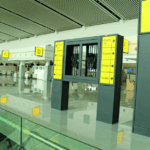
One of the many concerns in Nigerian airlines is the disruption and unreliable supply of aviation fuel, which most often hamper airline operations.
Many of the flight cancelations on domestic operations are due to delay in fuel supply. Besides the high cost of the product, which increases at the airports located up north, the supply of the product is fraught with hitches.
Airline operators are of the view that as long as the product is being imported and transported through Apapa in Lagos, the price of aviation fuel would always be high, and the supply would always be inefficient.
Last week the Chief Operating Officer of Dana Air, Obi Mbanuzuo disclosed that a single isle aircraft like the regular Boeing B737 or MD 83 which operates most of the domestic services, carries about 10,000 litres of fuel to operate a one hour flight and this include the 4000 litres that the flight would consume, the endurance fuel, which is another 4000 litres and a percentage of the 8000 litres, which could be put as 2000 litres, making it 10000 litres.
The 10, 000 includes the fuel that would be consumed on the flight and in case there is VIP movement or any incident that might delay the aircraft in the air or possible emergency.
The lowest price of the product is N235 to N250 in Lagos and in the other parts of the country; it could be as high as N280 per litre. So overall, an aircraft loads about N2.5 million litres of fuel for one-hour flight.
Now, the challenge is how to get fuel regularly and for the product to be sold at cheaper rate.
The CEO of Aero Contractors, Captain Ado Sanusi, who spoke to THISDAY about the fuel problem lamented that one of the challenges of aviation fuel is that in as much as it was deregulated officially, marketers still operate as a cartel. They do not open and compete on the prices.
The marketers he noted manage the product in a way that demand is always higher than supply, so the price is always high. This is exacerbated by the fact that it is imported.
The marketers pay a lot of charges which keep the price of the product high and higher than what an airline can get in the West Coast.
Sanusi, had called for the review of the product pricing because the prevalent situation is that “you wake up you learn that they have increased the prices of Jet A1 by 30 percent.
And you cannot quickly adjust your ticket prices to reflect that, but you have to buy that Jet A1 at the new prices in order to operate your flights that day; but the passengers have bought their tickets for that day’s flight at the old fares.”
So, airlines are under constant pressure on the price of aviation fuel.
“It is only in this country that this is done, and I think that there must be a way of introducing the new price regime, recognising that we are in a free market and it is not regulated. This will help you to know the cost of your operation every month, as you know that the price of fuel will not change and if it will change they will notify you.
“I think the airlines should come together and pressurise the oil marketers so that they should do the right thing. So that it won’t be something you just wake up and they increase their prices of Jet A1,” Sanusi said.
The airlines however expressed hope that if the product is refined locally the prices may come down. THISDAY learnt that everyone hopes that when Dangote completes his refinery and puts it on stream, there would be efficient supply of the product and the prices would come down.
The airlines generally agreed that as long as the product is imported, the prices would continue to be high. But some of the aviation stakeholders expressed doubt that Dangote refinery, when completed, may supply adequate volume of fuel that would meet the demand of local airlines and foreign carriers that tank fuel in the country before they depart to their destinations.
The Head of Communication of Air Peace Airline, Chris Iwarah, told THISDAY recently that airlifting high volume of fuel affects the number of passengers and luggage an aircraft may carry. So, if the product is available at the same price at every airport, an aircraft should not be loaded with round trip fuel.
“The consequence of filling the aircraft with round trip fuel means that we cannot carry all luggage in order not to exceed the maximum weight for the aircraft,” Iwarah said.
It is the view of some industry stakeholders that some refineries should be dedicated to refining aviation fuel. In that way its supply would be guaranteed, and the prices would become competitive.
THISDAY






